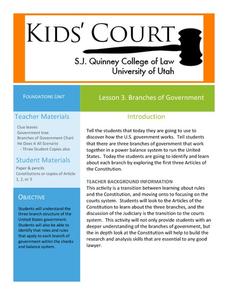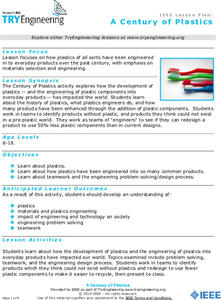Huntington Library
Everyday Life - Exploring the California Missions
Young scholars relive history as they examine primary sources that document everyday life in the California missions. During a class viewing of the included slideshow presentation, children analyze documents, paintings, and drawings in...
US Mint
Rename That State!
As Shakespeare famously wrote, "A rose by any other name would smell as sweet," but can the same be said for a state? In this elementary geography lesson, students are assigned specific states to research using the information they find...
Super Teacher Worksheets
Our Solar System Scavenger Hunt Activity
Send students on a search for facts about the solar system with this scavenger hunt activity. Whether they are finding out how far the sun is from the earth, or the names of all four gas giants, this resource will engage young scientists...
Super Teacher Worksheets
Mammal Scavenger Hunt Activity
Did you know that a polar bear's skin is actually black? Or that the lightest mammal weighs less than a paperclip? Young scientists learn these and other amazing facts about mammals as they explore the animal kingdom with this fun...
British Museum
The Kingdom of Benin
Discover the society of Benin through analysis of several artifacts and rich primary source materials. Here you'll find worksheets on topics as the work of Benin craftsmen, the influence of the all-powerful Oba, explanations for the...
Center for Civic Education
What Is Authority?
Young scholars examine the concepts of power and authority as they begin learning about government in this elementary social studies lesson. Through a series of readings, discussions, and problem solving activities, children learn about...
Center for Civic Education
What Basic Ideas Are in the Preamble to the Constitution?
Introduce young historians to the US Constitution with this upper-elementary social studies lesson plan. Beginning with a general discussion about the role of government in society, students go on to work in small groups identifying and...
Center for Civic Education
What Basic Ideas About Government Are Included in the Preamble to the Constitution?
Young historians explore the meaning of the Preamble to the US Constitution in this upper-elementary social studies lesson. Working with partners or in small groups, children discuss the purpose of government before reading and analyzing...
Blogger
Help with Reading
Children's education doesn't have to end when they leave the classroom. Support parents with imporving their children's reading comprehension skills at home with this list of guiding questions.
Curated OER
Lesson 3: Branches of Government
Young historians climb through the three branches of the US government in the third lesson of this five-part series. While reading the first three Articles of the Constitution in small groups, children write facts on paper leaves that...
Curated OER
Lesson 2: The Constitution: Our Guiding Document
Explore the structure and content of the US Constitution in the second lesson of this five-part social studies series. A collection of activities, games, and videos complement a class reading of a document summarizing the US...
We are Teachers
Read Like a Detective
Encourage your young readers to become true detectives in their next literary adventure! Here you'll find an attractive display that will prompt your learners to constantly be looking for clues, asking questions, making cases about the...
Skyscraper Museum
Building a Skyscraper
The construction of skyscrapers is no simple undertaking, involving the careful coordination and planning of many different people. The third lesson in this series explores this detailed process by first teaching children about the main...
Miama-Dade County Public Schools
Patriot Day September 11, 2011
While many of our learners may recognize the date of September 11, 2001 in the United States, most will not be able to personally recall what transpired. On Patriot Day, introduce your young learners to the events, aftermath, and...
Polk Bros Foundation
I Can Draw Conclusions: History Analysis
This worksheet outlines the very basic first steps to analyzing a historical topic and determining its significance. The resource prompts learners to identify important persons in history, list major events, and evaluate cause and effect.
Polk Bros Foundation
I Can Infer Predictions Based on an Analysis of Motive
Use a character or person's motivation as the basis for a prediction of that character or person's next action. Pupils select an individual from their reading, copy a quote, write down an inference about that character's motives, and...
Polk Bros Foundation
How to Summarize a Non-Fiction Passage
After reading a text, one way to find out how much your class comprehended is to ask your pupils to summarize. This worksheet helps class members prepare for writing a summary of a nonfiction text. They note down the topic, up to eight...
Institute of Electrical and Electronics Engineers
Engineered Music
Sound engineers investigate the structural design of a musical instrument, the recorder. They work in collaborative groups to choose an instrument to build out of everyday craft materials. It must be able to repeat a three-note sequence...
Institute of Electrical and Electronics Engineers
Be a Scanning Probe Microscope
Extensive reading is done in order to learn about scanning probe microscopy and nanoscale. Afterward, individuals use a pencil to probe an unidentified object that is inside of a box so that they cannot see it. Using only what they could...
Institute of Electrical and Electronics Engineers
Tennis Anyone?
After reading up on the history of sports racquets, engineering teams design and construct a racquet for batting a Velcro-striped ball at a target. Teams evaluate their design by aiming for the target three times each and answering...
Institute of Electrical and Electronics Engineers
Keep it Cool
This cool lesson plan is ideal for elementary engineers or physical scientists, especially when learning about heat transfer and insulation. After reading a page of background information, engineering teams collaborate to design and...
Earth Day Network
Healthy Earth, Sick Earth
Earth is sick and needs our help! Read the children's book Planet Earth Gets Well to explain the various problems facing the planet, discussing what young conservationists can do to heal the planet along the way. A great Earth Day...
Institute of Electrical and Electronics Engineers
A Century of Plastics
After reading about polymer materials, engineer trainees examine how plastics have been integrated into everyday products. In groups, they compile a list of products made entirely without plastics and then, as a closing activity, try to...
Institute of Electrical and Electronics Engineers
Biomimicry in Engineering
Take a look with your class at how nature supplies inspiration to engineers. In cooperative groups, youngsters research biomimicry and then develop a system that would help support people living on the moon. Each team also considers...





















